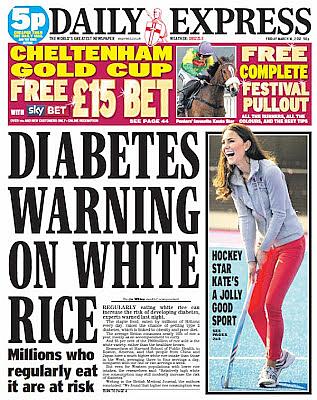How medical journal news releases may lead journalists astray

Canadian physician-blogger Yoni Freedhoff writes, "What Reading That White Rice and Diabetes Study Actually Told Me."
He analyzes methodological issues, questions the BMJ publishing the study, then adds:
But that's not the truly shocking part. This is. The BMJ published an accompanying editorial that rightly called the paper out on its methodological and statistical inadequacies and in conclusion stated,
"Although the findings of the current study are interesting they have few immediate implications for doctors, patients, or public health services and cannot support large scale action. Further research is needed to develop and substantiate the research hypothesis"
Yet what's the title and first line of the very same BMJ's press release regarding this statistically and methodologically weak paper,
"White Rice Increases Risk of Type 2 Diabetes
The risk of type 2 diabetes is significantly increased if white rice is eaten regularly, claims a study published today on bmj.com."
Where the next 6 paragraphs of the press release continue in that same conclusive and important sounding vein only to end with this last line,
"In an accompanying editorial, Dr Bruce Neal from the University of Sydney suggests that more, bigger studies are needed to substantiate the research hypothesis that white rice increases the chances of getting type 2 diabetes."
Guess which 7 of 8 press release paragraphs the media paid attention to?
Here are a sampling of actual media headlines as a consequence of the BMJ's misleading press release,
"Eating White Rice Daily Up Diabetes Risk" – CBS News
"White Rice ‘Could Cause Diabetes'" – The Independent
"Think Twice About Rice? New Study's Advice" – ABC News
"White Rice Raises T2 Diabetes Risk, Claim Academics" – The Daily Telegraph
"White Rice Linked to Diabetes Risk" – WebMD
"White Rice May Increase Your Risk of Diabetes" – MSNBC
And of course the Twitterverse went crazy too and rice bashing tweets abounded, and from some rather influential tweeps including Dr. Sanjiv Chopra, Dean of Continuing Education at Harvard Medical School, the Harvard School of Public Health itself, journalist Greta Van Susteren, the American Society of Nephrology, the Drudge Report, and many, many, many, many more.
Now I'm not suggesting white rice is a wise food to consume. On the contrary, I generally recommend people try to minimize its consumption, but to be very clear, this study does not in any formative way, shape or form have the strength to draw any conclusions whatsoever on the specific impact white rice has on the risk of developing type 2 diabetes.
And what the hell is up with the BMJ? Publish a paper so weak that you feel the need to co-publish an editorial questioning the paper's design and conclusions and then simultaneously put out a press release that in turn purposely glosses over and misinforms the media about the paper's weak conclusions?
The Behind the Headlines site in the UK published its usual thoughtful analysis of the study, "Rice ‘diabetes risk' overstated." Excerpt:
Although the review has found an association, it cannot prove that white rice itself directly causes type 2 diabetes, as there are many other factors that could affect the risk of developing the condition (such as physical activity, alcohol and obesity).
Kevin Lomangino, one of our story reviewers on HealthNewsReview.org, reminds us of another recent example of problems with a BMJ news release on an observational study – that time regarding chocolate.
Related content:

